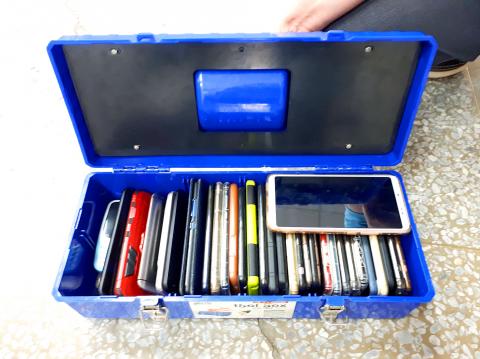Teachers have reported improved classroom environments after a policy to manage students’ use of mobile phones was implemented, National Hsinchu Senior Industrial Vocational School student affairs division head Liao Tsang-hsiang (廖倉祥) said on Sunday.
Following years of advice from parents, the school in August last year approved regulations to limit students’ use of mobile phones, tablets and cameras.
The 42 classrooms at the school are equipped with special boxes to store electronic devices, dubbed “chicken farms” — a play on the Chinese word for “mobile phone,” as one of the characters has the same pronunciation as “chicken” in Chinese, Liao said.

Photo: Hung Mei-hsiu, Taipei Times
Students are required to put their devices in the boxes during school hours, otherwise holiday work or demerits would be handed out, he said.
After about a semester of the policy being implemented, most teachers have reported positive feedback, with students paying more attention in class, while they no longer worry that photographs or videos would be taken without permission, school principal Lee Heng-lin (李恆霖) said.
“Any effect on academic performance has not been determined, but the improved classroom dynamics would undoubtedly benefit students in the long term,” Lee said.
Students spend more time playing basketball or solving Rubik’s cubes outside classtime without their devices, while there is more chatting and laughter on campus, Liao said.
In Taichung, several junior-high and high schools have implemented similar policies, with students only allowed their phones to contact their parents before and after the day’s classes.
However, some students still break the rules, some principals said.
While schools want to install a centralized phone management system using special locked boxes, they do not have enough funds, with one box costing more than NT$1,000, they said.
Some schools leave decisions about phone restrictions to each classroom, while allowing phone use under specific circumstances.
With approval from the student affairs division, students can bring a phone to school that is marked with a sticker, Dahua Junior High School principal Hsu Hsiu-ching (徐秀青) said.
The student can use such a phone to contact their parents or for academic purposes with their teacher’s permission, Hsu said.
Affiliated Senior High School of National Chung Hsing University requires students to turn off their devices at school, unless a teacher says otherwise.
Taichung Municipal Chang-Yie Senior High School keeps its junior-high students’ phones for them and requires senior-high students to turn off devices. Both groups have 30 minutes during their lunch break.
The Ministry of Education said schools have autonomy to define phone use regulations, as long as decisions are made through a democratic process involving teachers, parents and students.
Additional reporting by Chen Chien-chih and Wu Po-hsuan

The Ministry of Education (MOE) is to launch a new program to encourage international students to stay in Taiwan and explore job opportunities here after graduation, Deputy Minister of Education Yeh Ping-cheng (葉丙成) said on Friday. The government would provide full scholarships for international students to further their studies for two years in Taiwan, so those who want to pursue a master’s degree can consider applying for the program, he said. The fields included are science, technology, engineering, mathematics, semiconductors and finance, Yeh added. The program, called “Intense 2+2,” would also assist international students who completed the two years of further studies in

The brilliant blue waters, thick foliage and bucolic atmosphere on this seemingly idyllic archipelago deep in the Pacific Ocean belie the key role it now plays in a titanic geopolitical struggle. Palau is again on the front line as China, and the US and its allies prepare their forces in an intensifying contest for control over the Asia-Pacific region. The democratic nation of just 17,000 people hosts US-controlled airstrips and soon-to-be-completed radar installations that the US military describes as “critical” to monitoring vast swathes of water and airspace. It is also a key piece of the second island chain, a string of

Taiwan will now have four additional national holidays after the Legislative Yuan passed an amendment today, which also made Labor Day a national holiday for all sectors. The Chinese Nationalist Party (KMT) and Taiwan People’s Party (TPP) used their majority in the Legislative Yuan to pass the amendment to the Act on Implementing Memorial Days and State Holidays (紀念日及節日實施辦法), which the parties jointly proposed, in its third and final reading today. The legislature passed the bill to amend the act, which is currently enforced administratively, raising it to the legal level. The new legislation recognizes Confucius’ birthday on Sept. 28, the

A magnitude 5.9 earthquake that struck about 33km off the coast of Hualien City was the "main shock" in a series of quakes in the area, with aftershocks expected over the next three days, the Central Weather Administration (CWA) said yesterday. Prior to the magnitude 5.9 quake shaking most of Taiwan at 6:53pm yesterday, six other earthquakes stronger than a magnitude of 4, starting with a magnitude 5.5 quake at 6:09pm, occurred in the area. CWA Seismological Center Director Wu Chien-fu (吳健富) confirmed that the quakes were all part of the same series and that the magnitude 5.5 temblor was